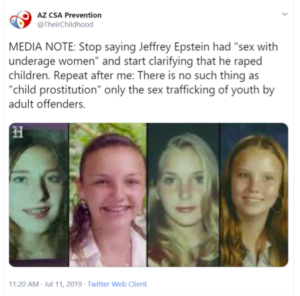By Emily Hagstrom, Contributing Writer
On July 8, Jeffrey Epstein, one of the most powerful financiers in the United States, was arrested and charged with sex trafficking and conspiracy to engage in sex trafficking. His alleged victims? Children—girls as young as 14 years old.
 As Epstein faces these charges in federal court, media outlets across the country are breaking the story. The case’s widespread coverage highlights the gravity of the allegations Epstein faces. Yet, a scan of the news, and of social media posts like one from Arizona Child Sexual Abuse Prevention, point out that several outlets have described the case irresponsibly. Strewn with phrases like “underage women” and “sex with minors,” stories reporting on the Epstein case appear to obscure the facts.
As Epstein faces these charges in federal court, media outlets across the country are breaking the story. The case’s widespread coverage highlights the gravity of the allegations Epstein faces. Yet, a scan of the news, and of social media posts like one from Arizona Child Sexual Abuse Prevention, point out that several outlets have described the case irresponsibly. Strewn with phrases like “underage women” and “sex with minors,” stories reporting on the Epstein case appear to obscure the facts.
Epstein, who pleaded not guilty, is charged with raping, sexually violating, exploiting, and facilitating the exploitation of children for money. When news outlets substitute phrases like “underage women” for girls or children, and “sex with minors” for rape, they assign a level of consent and autonomy to the victims and survivors in this case. “Sex with minors” implies that children can consent to sex for money—however, under the federal Trafficking Victims Protection Act, there is no such thing as a “child prostitute.” And increasingly, state legislators have enacted “safe harbor” laws (PDF) to recognize trafficked youth as victims/survivors of trauma, not criminals. Journalists might also recall that, following a sustained campaign by anti-trafficking groups (#nosuchthing), the Associated Press in 2016 declared the phrase “child prostitute” has no place in news coverage. Continued use of the phrase contributes to misinformation about sex trafficking and can stigmatize and retraumatize trafficking survivors.
Beyond this, referring to children as “underage women” contributes to the hyper-sexualization of young girls. A 2007 American Psychological Association meta-analysis (PDF) shows that entertainment media and advertising often portray young girls as sex objects, shown wearing more revealing clothing than boys their age and framed to imply sexual maturity. According to UNICEF USA, sexual objectification contributes to gender-based violence—including sex trafficking of young girls. That means that by reporting on sex trafficking irresponsibly, media outlets can contribute to—instead of mitigate—the underlying societal influences that allow sex trafficking to take place.
Further, multiple news stories cite that investigators found “a vast trove” of pornographic photos featuring “young-looking” women and girls in Epstein’s New York home. In claims against Epstein, women have also stated that Epstein and his peers coerced them into taking sexually explicit photographs as children. In reporting on this evidence, media outlets have failed to point out that child pornography is sexual exploitation (PDF), and constitutes human trafficking when used for commercial gain. Failing to make this connection not only obscures federal sex trafficking law; it also downplays the severity of child pornography and mutes the allegations against Epstein. Child pornography is always evidence of sexual exploitation.
Language matters. Now more than ever, journalists must pay attention to their words. Let girls be the children they are. Call sexual exploitation what it is. Extra care and attention are crucial to accurately describing the complex world of sex trafficking. Without responsible reporting, media outlets run the risk of making the problem worse instead of better.

Emily “Em” Hagstrom is a freelance writer, researcher, and advocate for violence prevention and gender equity with a background in public policy and media production. She most recently managed the publication of the Status of Women in NC: Health and Wellness Report (PDF) and has written for several organizations including the National Women’s Law Center, the Feminist Majority Foundation, and Women AdvaNCe.
Em can be reached at ehagstromnc@gmail.com and on Twitter/X @emhagstrom.
